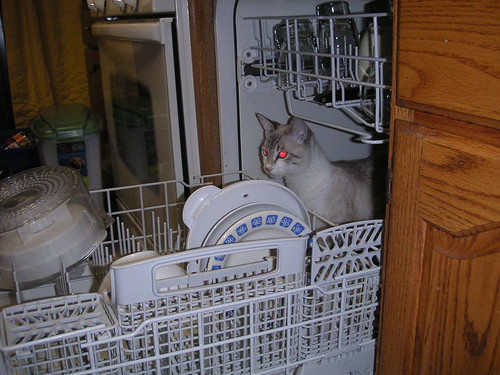The other day I talked about buying a newer fridge to save on energy costs. For fridges I concluded that if your fridge is 20 year old or so then it makes good sense to upgrade to a new model due to the energy savings. Today I'll look at purchasing energy saving dishwashers.
It appears that almost all Dishwashers meet the Energy Star criteria. So simply picking Energy Star models isn't enough detail to sort the best from the rest. To find the really energy efficient models you have to dig further. The Energy Star website for dishwashers has an Excel sheet that compares models and lists their energy usage.
Shopping around a little and comparing models, I found the cheapest dishwasher at Home Depot is an Americana model for $199 and costs $36 a year to operate. The Americana model is Energy Star compliant. I looked through several of the Maytag, Amana, Jenn-air, GE and LG dishwashers on HomeDepot's website and I didn't find any that used less than $33 a year in energy.
I found that the Asko brand of dishwasher seems to be very efficient. They have a model that consumes 194 kWh annually or about $19 in electricity. I found reference on via web search to these dishwashers costing over $1000. The additional $800 cost is certainly not worth the $17 difference in energy.
Then I found a Bosch model that goes for about $800 at Sears and uses about $25 a year of energy. But again $600 more in cost isn't worth an $11 annual savings.
If you compare the cheap $199 Americana model to the most energy efficient dishwasher out there the best you'll do is saving $17 a year. I wouldn't pay over $150-200 premium for such a savings. But the most energy efficient models seem to run in the $800-1000 range.
My conclusion is that energy savings alone are not worth justifying the purchase of an expensive dishwasher.
But I would not ignore the energy usage of the appliance when making a purchase.
Here is what I'd do if shopping for a new dishwasher:
1. Decide what features you want in the dishwasher first
2. Shop for and identify the models that meet your needs.
3. Compare energy savings among those models.
4. Pick a model that meets all of your needs with energy efficiency as one of your selection criteria.
Should you update an old dishwasher?
I found this page from the Office of Energy Efficiency at Canada which cites the energy efficiency of older dishwashers:
| 1984 | 1990 | 1997 | 1999 | 2004 | |
|---|---|---|---|---|---|
| Dishwashers | |||||
| Standard | 1213 | 1026 | 649 | 640 | 457 |
| ENERGY STAR qualified | – | – | – | – | 422 |
If you compare that to today's models which use around 200 to 500 kWh a year a dishwasher from 10 or 20 years ago is significantly less efficient. A 10 year old dishwasher uses roughly double the energy of today's models and a 20 year old dishwasher uses almost 4 times as much.
If you have a 10 year old dishwasher today it is using around 640 kWh of power a year which equates to about $64 (at 10¢ per kWh). If you replaced that model with a new model like the basic Americana dishwasher then it would drop to $36 a year in energy costs. Thats a $28 annual savings. Based on a purchase cost of $199 thats a 14% annual return or a 7 year payback period.
For a 20 year old dishwasher on the other hand you are currently using around 1000 to 1200 kWh a year. So thats $100 to $120 in energy costs. Updating to a new basic model today would save you $64 to $84 a year. Thats a 32% to 42% annual return for a 2-3 year payback period.
Replacing a 10 year dishwasher isn't likely to save you enough money to justify the cost. However, replacing a 15-20 year old dishwasher is likely to be well worth the investment in a new and inexpensive dishwasher model at least.
If you're going to evaluate replacing your own dishwasher then you should check the energy guide information for your current model if you can find it.
*Photo from ewen and donabel



